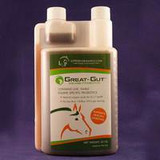Q. What is a probiotic? Why are they so important for my horse? How can I be sure I am using the right probiotics? What is so special about equine specific probiotic?
A. Probiotics are defined as “good” bacteria that nearly any animal with a gastrointestinal tract (GIT) can benefit from. When an animal (or human) digests food the body breaks down the nutrients while at the same time creating bacteria. Some of those bacteria are good (probiotics) while others are bad (pathogens). By taking a supplement that includes multiple probiotic strains we are populating the GIT with good bacteria which are necessary to fight off pathogens like salmonella. We can go into a much more in-depth conversation on the mode of action of probiotics but the bottom line is that probiotics are a necessity for a good, balanced intestinal tract.
Q. Ok, so probiotics are important but which ones are the most beneficial?
A It has been studied that when using probiotics to promote a healthy GIT that host-specific probiotics have a greater chance of survivng and colonizing in the GIT. Colonization is critical as it is the ability of a probiotic to stay within the GIT and harvest additional probiotics compared to simply flushing through the system. When we feed human, or bovine, derived probiotics (which is what is in 99% of equine probiotic supplements today) to our horses there are some benefits but when using equine specific probiotics we greatly increase the chance of success. “Generally, host-specific strains are believed to be able to colonize the GIT of the indigenous host for longer periods of time.” (A. Schoster, J.S. Weese and L. Guardabass published 9/17/2014)
Q. So now that I have some good bacteria in my horses GIT what are the benefits?
A. Great-Gut is specially designed to help your horse manage digestive stress caused by hay fluctuations, stress, competition, transport, surgery, hospitalization, disease, training, unhealthy diet, or changes in diet. It may also help prevent some forms of colic.
Q. What probiotic product is right for my horse?
A. There is a lot to consider when purchasing a product – cost, ingredients, Made in the USA, etc. We encourage you to go beyond the pretty label or fancy advertising and really look at the product. For probiotics and any other supplement on the market the key is reading the label. We urge our clients to look at the ingredients and concentration of those main ingredients. Many probiotic based products do not contain living, viable probiotics and certainly do not contain equine specific probiotics. Great-Gut has over 1 billion CFU’s per 2 oz. serving which not only is a significant amount but is higher than most equine probiotics on the market.
Q. I have heard that probiotics must be refrigerated, is that true with Great-Gut?
A. Simple answer is no. It is widely known that probiotics do not remain stable under certain conditions with liquid and heat being the main two culprits. Due to a proprietary process, the probiotics in Great Gut remain viable despite being in a carrier (liquid) that is typically unfriendly to probiotics. We do not require that Great-Gut is stored in a refrigerator however we do recommend storing Great-Gut, and all other supplements, in a cool, dry room.
Q. I see that Great Gut contains organic acids. What are they and why are they necessary for my horse?
A. The organic acids in Great Gut is what really separates it from all other probiotic products on the market. The organic acids are not added to the product but they are a natural by-product created during the fermentation process. Organic acids lower the pH in the GI tract, creating unfavorable conditions for harmful bacteria like salmonella to survive. This results in reduced uptake of harmful bacteria by the horse and a smaller bacterial load within the GI tract. The reduction in overall bacterial load, in turn, reduces the competition between the host and its gut microflora for nutrients creating an ideal digestive environment.
Furthermore, organic acids reduce the buffering capacity of food, resulting in increased levels of hydrochloric acid (HCl) in the stomach and improved nutrient digestibility. The reduction in pH also increases pepsin activity and stimulates the secretion of pancreatic enzymes, which also improves nutrient digestibility. Finally, organic acids help reduce inflammation within the GIT which is critical for proper nutrient absorption. Whenever there is inflammation within the GIT it can affect several functions of the intestinal tract including intestinal villi. Villi are finger like substances that are essential for the absorption of digested nutrients. Properly functioning villi allows the body to absorb nutrients which helps maintain a better overall immune system and healthier horse.

